Prime-Video - Black Hearts : Discover the trailer of the new French series Amazon Exclusive
By Mulder, 03 january 2023
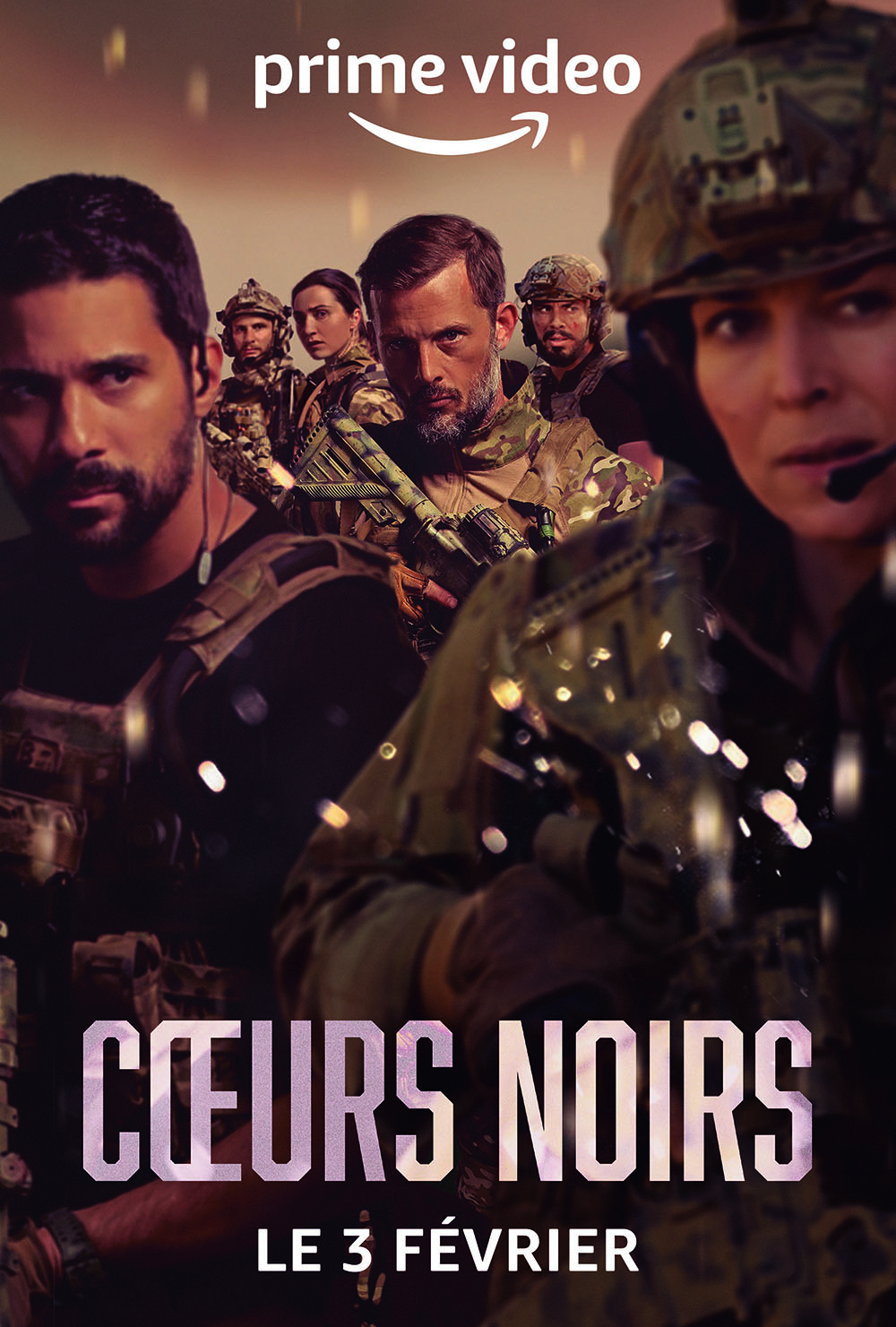
Prime Video today unveiled the trailer for Cœurs Noirs, the new 6-episode Amazon Exclusive action series that follows a French Special Forces commando in the midst of the war against Daech.
Directed by Ziad Doueiri (Baron Noir, L'Insulte, Dérapages) and starring Nicolas Duvauchelle (Braquo, Polisse, Un homme d'honneur), Marie Dompnier(Les Gazelles, Les Témoins), Tewfik Jallab (Engrenages, Ce qui nous lie, Oussekine), Nina Meurisse(L'escalier, La vie d'Anaïs, Camille), Jérémy Nadeau, Victor Pontecorvo, Quentin Faure, Thierry Godard and Moussa Maaskri, Cœurs Noirs is the first collaboration between Prime Video and France Télévisions. Created by Duong Dang-Thaï and Corinne Garfin (Le Bureau des Légendes), produced by Gilles de Verdière of Mandarin Télévision, this series will first be broadcast exclusively on Prime Video in France, Belgium, Switzerland and Luxembourg on February 3, then nine months later on France Télévisions
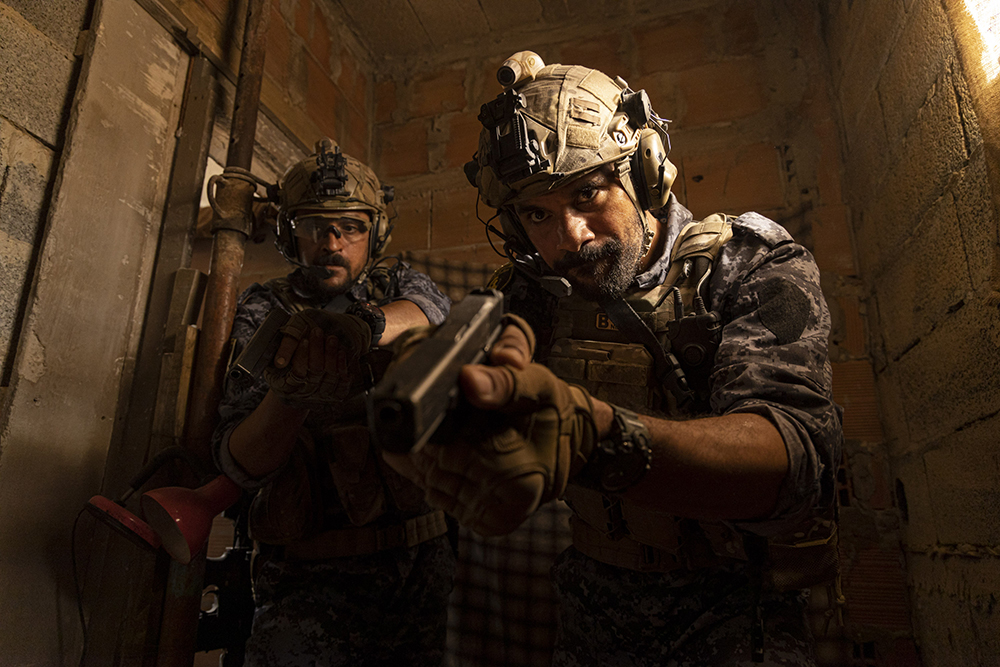
Black Hearts follows a group of French Special Forces deployed to Iraq on the eve of the battle for Mosul in October 2016. The members of this commando are tasked with finding and exfiltrating the daughter and grandson of an important French Daech Emir whom they have captured and who will only cooperate with them on this condition.
Black Hearts is an event in more ways than one. From its context, that of a special forces commando, never before seen in a French television series, and also from its ambition to be both an immersion in the reality of this military corps and a popular entertainment, full of spectacular action scenes.

A double mission that the producer at the initiative of such a project, Gilles de Verdière, has set himself: "My initial desire was for a subject that could go in this direction. The French army being one of the few that intervenes abroad seemed ideal to me. In particular the special forces, whose modus operandi and protocols allowed me to approach the art of war in the French way, very different from those of Russia, the United States or Israel. What remained was to find a plot that would allow the interweaving of psychology and action without betraying the daily life of a commando. Gilles de Verdière turned to Corinne Garfin and Duong Dang-Thaï, two screenwriters who had come close to the world of intelligence while working on The Office of Legends.
Corinne Garfin recalls, however, that the task was different: "Purely military intelligence as practiced by the DGSE and that of the special forces have nothing in common. These are not the same ways of proceeding, of questioning sources. Moreover, Le Bureau des Légendes prided itself on being in Paris, on being a real office series. Coeurs Noirs is exactly the opposite, taking place exclusively abroad. So we needed a concrete geopolitical context to help us do that. In May 2017, when we started writing, Daech was still something of a blur, but the French press was already reporting on special forces that would be in Iraq tracking down jihadists. That seemed to us an obvious starting point. A lead confirmed by Gilles de Verdière: "The fundamental challenge of Coeurs noirs was to be both particularly immersive and documented; not pure entertainment disconnected from reality.
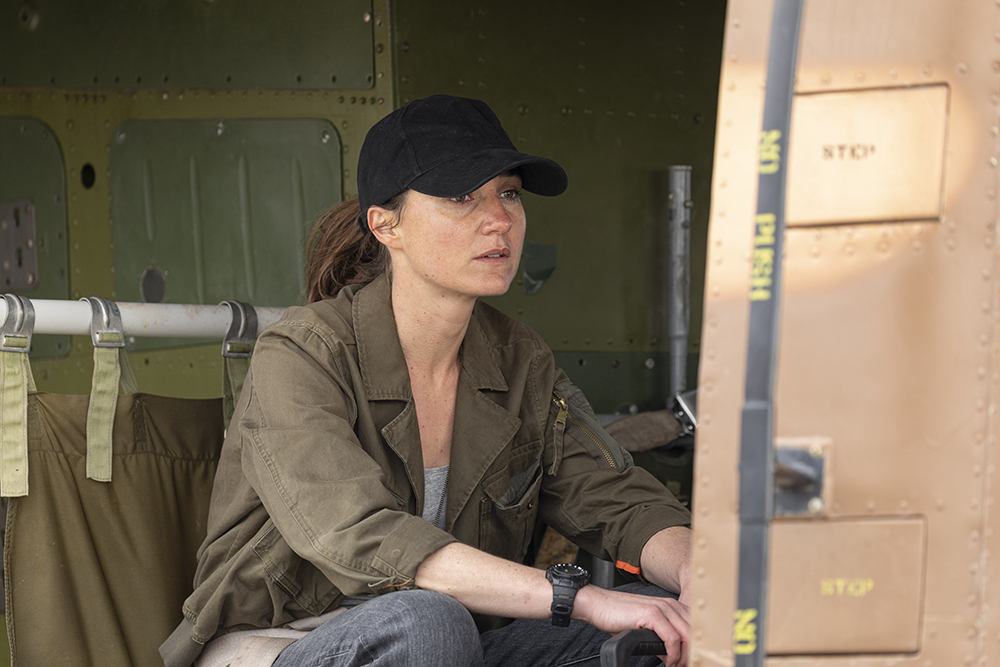
It was therefore necessary to link this series to a historical event but also to find the right distance from current events, facts that were sufficiently complete not to be called into question by new geopolitical upheavals. Despite the consequences in Iraq, the battle of Mosul being over, there would be no more obstacles to the dramaturgy. This will be achieved through the cohesion between the characters, each of whom must have his or her own individuality while being an integral part of a group, sketched out little by little over these three years of writing for Thaï and Garfin: "We advanced touch by touch, helped by the freedom of not having had any imposed narrative arcs. The objective was to remain naturalistic in order to express where the sense of commitment comes from for this commando. The two scriptwriters found precious help from Redouane Louaazizi, former group leader of the 13th Parachute Regiment, who became a military advisor on Coeurs Noirs. "Whether it takes place in the Levant, Mali or Afghanistan, the idea was to evoke the Special Forces. Their missions are identical whether they are in one region or another. The real key point remained a loyalty to their work and their environment. However, there is a limit to the secrecy of their missions. Some very sensitive points in this sense were not to be discussed. However, the presence of the special forces in Iraq could no longer be hidden after the media coverage of François Hollande's visit to the theater of operations. I then suggested to Corinne and Duong to do their own research

The question of authenticity will continue to be raised once the writing of the episodes and the casting are completed. The answer will come from the very source of Cœurs Noirs: the scriptwriters and actors were in close contact with the 13th RDP. Gilles de Verdière wanted this to be the case: "When I decided to deal with this subject, I quickly went to see the military institution: I needed such an immersion and without a partnership with them I would not have done it on principle. However, there was no question of Black Hearts falling into propaganda. I submitted a pitch to the Special Operations Command (SOC) to get their reaction. We worked a lot with them, and they said no on certain points. Not because they touched on defense secrecy, but because they did not correspond to the state of mind of the Special Forces.
The actors literally gave shape to the film, during a stay where they followed the same training as the members of the commando. Nicolas Duvauchelle has recovered his health. "It was extremely physical, from the early mornings doing pull-ups in the gym or jogging to night walks. Everything is in the service of an impeccable lifestyle. I had to drink two beers in five months, which is still a feat for me (laughs) but it gave me the necessary discipline: once the body is there, the head follows. An essential strategy for Marie Dompnier " To play this kind of role, it was essential to be physically credible. Training. But this immersion course also nourished a psychological aspect: to meet the Special Forces is also to realize that they are in contact with an unheard-of violence, know the dark side of the world that they must counteract with measured decisions. It's almost their DNA: to be in the most physical action and the most intense intellectual reaction at the same time. The rapprochement with the units of the 13th RDP was not only an opportunity to get back in shape.

The immersion in the daily life of the regiment was also intended to bring out a fundamental part of intimacy in Coeurs Noirs. For Gilles de Verdière, "the driving idea was to check off several boxes. That of the action but also that of the psychology of the characters. The intimate dimension of any war conflict is fundamental. An Iraqi general, head of the ICTS (Iraqi special forces) had a phrase that struck me: "You can't fight a war well with hate". This is precisely why this series is not called Force 45 but Black Hearts: it reveals the omnipresent stakes, whether intimate, moral or sentimental, of such a context, which confronts the meaning of one's life and death. A principle endorsed by Tewfik Jallab: "I like the idea of this reflection of daily life outside of combat through moments that may seem anecdotal: the little phone calls they make to their loved ones, their families, very ordinary conversations: how did it go at school, how are we going to redo the kitchen? It allows us to understand quite quickly that the members of the special forces cannot talk about the horror of what they live on the front, while bringing them closer to the spectators who saw them there"; as by Nicolas Duvauchelle: "We also met the wives of soldiers who told us what they lived through while their husbands were on mission, sometimes for long periods. Knowing how they dealt with the absence of their children and their couples at home made them just as strong

The place of women in Coeurs Noirs is precisely central: within the group, several roles, from Adèle, the commanding officer, to Sab the long-distance shooter. Gilles de Verdière was keen on this from the beginning of the series. "One of the strong inspirations for Black Hearts was The War Does Not Have a Woman's Face, the book by Nobel Prize winner Svetlana Alexievitch. It includes the moving testimonies of Russian, Belorussian and Ukrainian women who fought during the Second World War in the battalions of the Red Army, particularly in the snipers. When the war ended, they fell silent. I wanted to deal with this axis of women in the war. By female characters, who are not trophy wives, but women of action. Nina Meurisse saw it as a particularly significant act. "That my role, that of Marie or of all the women in this series, are not in the claim but in the action, confers them a lot of power. This is not the image that is given to them, especially in the representation of this milieu. A great sorority comes out of it". Marie Dompnier is delighted with the density given to the female characters: "I was very happy to play Adele because of the richness of a role that shows her as much in the passion of her profession as in the difficulties of her personal life, where I am usually offered roles with a dominant. Not to mention that the fact that she is a commander is treated as a non-event, it is a given, period. In this too, Coeurs noirs reflects a modernity that has become the reality of the French army.
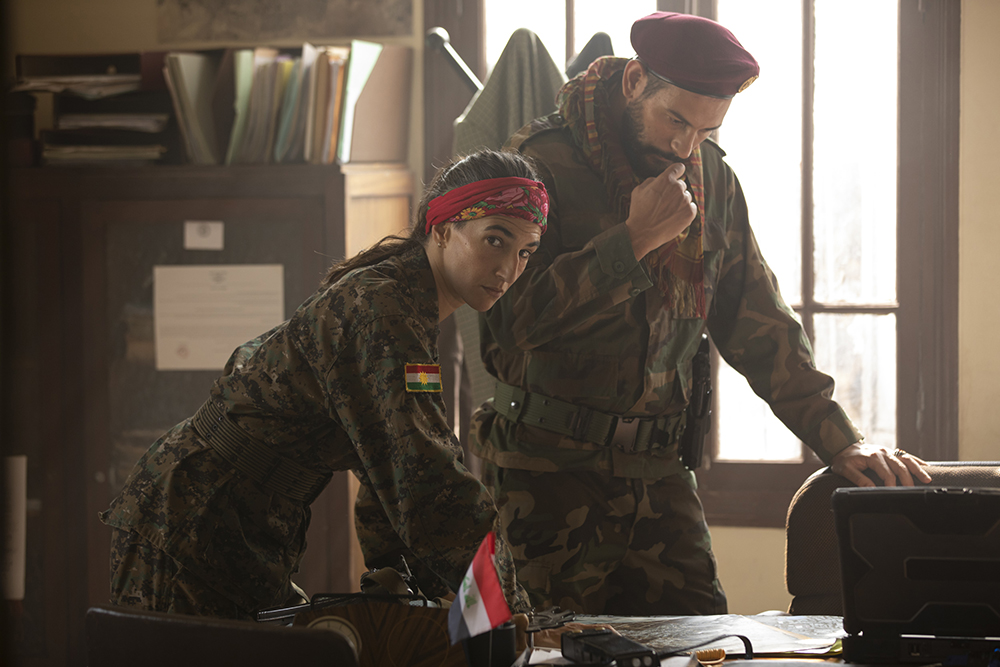
The only departure from this reality is the character of Sab, a long-distance shooter, a position that does not yet exist in the French special forces. However, Nina Meurisse did not see this as an obstacle to her playing the role: "I even think it's great that it's possible. My instructor was even proud of it. For him as for me, the question of gender for this task never arose. If Redouane Louaazizi was initially suspicious of this deviation from the facts, he quickly accepted it: "When, during the first meeting, I read the first draft of the scenario and discovered that the long-distance shooter was a woman, I was taken aback. But then I understood what Gilles and the scriptwriters wanted to bring. And after all, even if it's still rare, there are now a few cases of women in this position in the infantry. Perhaps Black Hearts will give rise to vocations within the special forces... ". The final crucial point for the success of Black Hearts: finding a director capable of achieving the desired balance between the immersive vision and the spectacular. Ziad Doueiri, nourished by his professional experience in the United States, which led him to be a regular collaborator of Quentin Tarantino, was the perfect choice. "I had understood at the beginning that it was a much more psychological series. But for me, it was not necessary to be afraid to evolve towards action, since in the reality of the situations described in Black Hearts, the two merge.
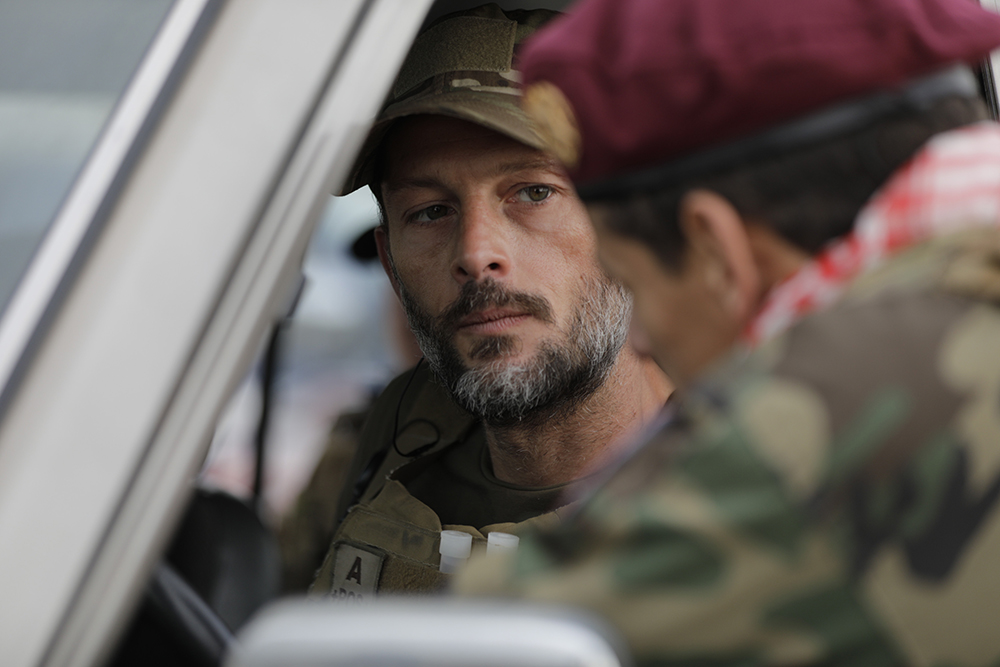
Doueiri's know-how will also manifest itself in a very pragmatic way. His personal background as a Lebanese who experienced the civil war reinforced the veracity of certain details during the shooting in Morocco. "Some places in Marrakech reminded me of the dividing line between West and East Beirut. I pushed the decoration team to amplify this resemblance. Also, my adolescence makes me recognize the sound of weapons by ear. I know for example how to distinguish between the sounds of an M16 and a Kalashnikov, or how to differentiate the whistling of rockets. So naturally I worked with the sound engineers on the combat scenes.
Doueiri's contribution made it possible to assume the influence of a certain American cinema on a French series. Gilles de Verdière claims this hybridization: "I've always had an appetite for war films, I'm a big fan of Kathryn Bigelow (NDR: the director of Demineurs and Zero Dark Thirty, among others). But this is a genre that hardly exists in France, and even less so in series. This unprecedented attempt has seduced the actors, whether Tewfik Jallab: "It is a unique case of alliance between the great spectacle, breathless blockbuster and existential questioning of our cinema of author. It was a real challenge, but even more a real thrill"; or Marie Dompnier: "I felt this desire. The most extraordinary thing is this mixture of a frontal action series, which may seem simple but difficult to do, and the approach of more complex, more muted, darker things."

Actors, director or producers, all agree on the background of Black Hearts, series fully questioning the notion of heroism or refusing to be the denial of the consequences of such a context. Redouane Louaazizi saw a usefulness for the military institution: "post-traumatic syndrome was a taboo subject until 2010 in the army. The Ministry of the Armed Forces has become aware of the phenomenon. We wanted to address it in Black Hearts because we need to talk about it. It is a reality that the special forces are very much confronted with. Gilles de Verdière believes that this syndrome affects more than just the military: "War is a relationship with trauma. The real struggle of these men and women is to know how to deal with the possibility, or even the order to kill. It is a subject that now concerns the younger generations who only perceive war through video games such as Call of Duty, whereas these conflicts have nothing to do with games or high-level sports. That's why with Black Hearts, we tried to show the flaws of the characters. They are not superheroes because they face their anguish, their failures. They are above all human beings. Black Hearts wants to show people who surpass themselves, who go looking for resources within themselves to fulfill their missions. I think this is what the French public expects. You only have to look at the ratings for military ceremonies on France 2 to be convinced. People want to rediscover a certain form of pride through this reformulation of heroism filmed at the level of men and women."
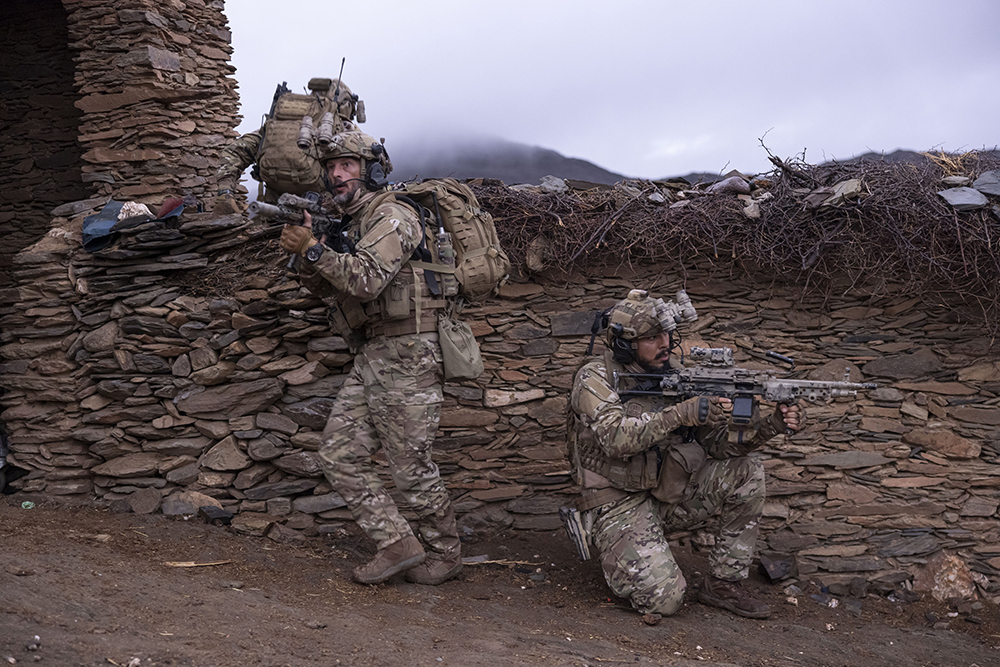
Black Hearts will add to the thousands of series and movies available in the Prime Video catalog, such as the critically acclaimed Amazon Originals Jack Ryan, Good Omens, Star Trek: Picard, Carnival Row, American Gods, The Boys and The Fabulous Mrs. Maisel, as well as French Amazon Originals like True Story, LOL: Qui Rit, Sort! Mixte, Le Bal des Folles, Orelsan: Montre Jamais ça à Personne, Hawa, Overdose, Celebrity Hunted: Chasse à l'Homme Seasons 1 and 2, or exclusive programs like Forte, Connectés, Je te Veux Moi Non Plus, After: Chapter 3, and many more - all available on Prime Video at no extra cost to Amazon Prime members.

(Source: press kit)

